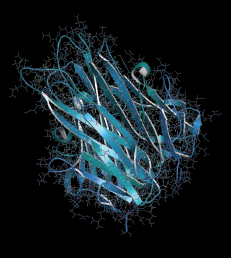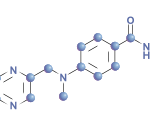
A 3D rendering of a TNF alpha cytokine protein molecule, such as infliximab, adalimumab, certolizumab and etanercept.
molekuul_be/shutterstock.coma
WASHINGTON, D.C.—Juvenile idiopathic arthritis (JIA) patients taking TNF inhibitors don’t develop new cancers at a higher rate than JIA patients who don’t take TNF inhibitors, according to the largest study so far conducted to study the possible link.
The findings were reported at the 2016 ACR/ARHP Annual Meeting in an abstract session that also included reports on osteoporosis care for rheumatoid arthritis patients and tofacitinib for psoriatic arthritis.
TNF Inhibitors & Cancer
In 2009, the FDA began labeling TNF (tumor necrosis factor) inhibitors with a warning that lymphoma and other malignancies have been reported in children and adolescents treated with them. Studies looking at cancer rates in JIA have typically included very few patients taking TNF inhibitors, but retrospective studies examining the issue have found no link between the drug and cancers.
In the study led by the University of Alabama at Birmingham, data were drawn from the U.S. Medicaid Analytic eXtract (MAX) data set from 2000 to 2010 and from U.S. Truven MarketScan claims data from 2010 to 2014.
The analysis included 27,038 JIA patients followed for a median of 1.4 years and an average of about four years. A total of 3,297 of the patients took TNF inhibitors.
Researchers found there were 20 incident malignancies—not counting nonmelanoma skin cancers—in the JIA population as a whole, which had a standardized incidence ratio of 2.4 compared with what is expected in the general population, based on Surveillance, Epidemiology, and End Results (SEER) data. There were seven incident malignancies among those taking TNF inhibitors—an SIR of 2.9 compared with what would be expected for the general population.
The results generally agree with prospective studies of adults with rheumatoid arthritis (RA) on TNF blockers, said Timothy Beukelman, MD, MSCE, associate professor of pediatric rheumatology at UAB.
“The diagnosis of JIA was associated with a subsequent increased rate of malignancy irrespective of treatment,” he said. “Malignancy rates following treatment with TNF inhibitors were similar to rates among JIA patients who did not receive TNF inhibitors.”
Tofacitinib & PsA
In another study, researchers showed for the first time that the JAK inhibitor, tofacitinib, is effective in patients with psoriatic arthritis (PsA) with active disease who have had an inadequate response to conventional synthetic disease-modifying (csDMARD) therapy. The study was sponsored by Pfizer, the drug’s manufacturer.
Patients in the study needed to have had a PsA diagnosis of at least six months, with active plaque psoriasis at screening and inadequate response to at least one csDMARD, but with stable ongoing treatment on one csDMARD.
A total of 422 patients were randomized to a 5 mg tofacitinib group, a 10 mg tofacitinib group, a 40 mg subcuteanous adalimumab group or a placebo group. The placebo group was switched to tofacitinib doses—half to 5 mg and half to 10 mg—at three months, after they were assessed for ACR20 criteria. At 12 months, all patients were assessed for radiographic progression.
ACR20 rates at Month 3 and rates of radiographic progression at Month 12 were superior to placebo and similar to adalimumab for the tofacitinib groups, with some patients seeing an ACR20 response as early as two weeks from the start of treatment, said Philip Mease, MD, clinical professor of rheumatology at the University of Washington.
“Tofacitinib is a potential future treatment option for psoriatic arthritis patients,” he said.
RA & Bone Loss
In a study involving data for more than 11,000 RA patients, researchers found that screening and treatment for osteoporosis can be lacking in RA. Researchers drew from the National Data Bank of Rheumatic Diseases, a prospective observational study of adult patients with RA or osteoarthritis who completed semi-annual questionnaires between January 2000 and December 2014.
Researchers found that about 50% of the RA patients were at enough risk for fracture and bone loss to warrant anti-osteoporosis treatment under the 2010 American College of Rheumatology guideline on glucocorticoid-induced osteoporosis, said Gulsen Ozen, MD, a rheumatologist and researcher with the University of Nebraska Medical Center and Marmara University in Instanbul, Turkey. But half of these patients never received any anti-osteoporosis medication.
They also found that osteoporosis or bone mineral density screening has been declining for RA patients since 2008.
Dr. Ozen said the findings show that osteoporosis care is “still suboptimal in RA and not getting better.”
“Underutilization of osteoporosis treatment and screening should be improved in RA patients, especially in male patients,” Dr. Ozen said. “Effective interventions are needed to improve this care and the burden of osteoporotic fractures.”
Thomas Collins is a freelance medical writer based in Florida.
Miss Any of These Important Sessions?
If you missed any of these important sessions, find them on SessionSelect.
References
- Beukelman T, Xie F, Chen L, et al. Tumor necrosis factor inhibitors and the risk of malignancy in the treatment of JIA [abstract 2982]. Arthritis Rheumatol. 2016;68(suppl 10).
- Mease PJ, Hall S, FitzGerald O, et al. Efficacy and safety of tofacitinib, an oral janus kinase inhibitor, or adalimumab in patients with active psoriatic arthritis and an inadequate response to conventional synthetic DMARDs: A randomized, placebo-controlled, phase 3 trial [abstract2983]. Arthritis Rheumatol. 2016;68(suppl 10).
- Ozen G, Kamen D, Mikuls T, et al. Trends and determinants of osteoporosis preventive and management care in patients with rheumatoid arthritis compared to osteoarthritis [abstract 2986]. Arthritis Rheumatol. 2016;68(suppl 10).

